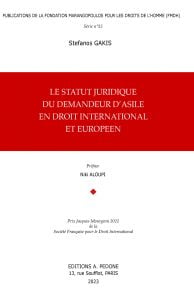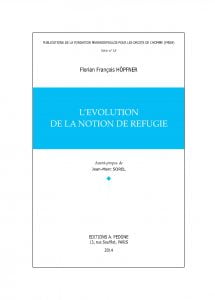
Author(s): Höpfner, Florian François
The intensification of the relations among peoples, societies, nations and States generates a multitude of fields of potential tensions among the same actors. International law proves to be an effective means of appeasement of these tensions and the multiplication of international regulatory frameworks follows the rationale of such intensification of international relations.
The Geneva Convention on the status of refugees responds specifically to the tensions aroused by the transboundary displacements of populations claiming that they will be persecuted in case of returning to their State of origin. In its version resulting from the New York Protocol relating to the status of refugees, the Convention constitutes the only normative framework of universal scope dealing with these forced movements of persons, but regulatory efforts are also appearing at the regional level. The application of regional standards to specific cases raises the question of the articulation between various legal orders, when several normative frameworks are intended to govern a given situation.
Looking for answers to conflicts of norms and divergences of interpretations gives access to a vast field of topics of interest to international lawyers. Furthermore, if we opt for a European perspective, the situation of the refugee is governed by a variety of legal orders, partially overlapping and equipped with varied control mechanisms. This leads to questions about the turbulent interaction between national, regional and universal legal orders, the harmonisation of standards and, ultimately, the coherence of the whole.
This work therefore mainly pursues two objectives. The first -the main objective- focuses on refugee law in particular and aims to demonstrate the evolution of the notion of refugee. The second one falls within the framework of the study of general international law and demonstrates that refugee law constitutes a particularly interesting example of normative creation in the international order, a creation, not always initiated by States but otherwise extremely effective.
